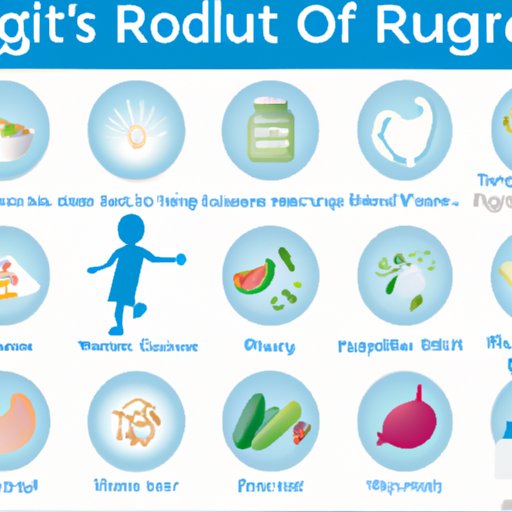Introduction
Gut health is a hot topic in the health and wellness world right now. It affects our overall physical and mental wellbeing, so it’s important to pay attention to it. But what exactly is gut health? The term “gut health” refers to the overall health of the digestive system, which includes the stomach, intestines, and other organs involved in digestion.
Common issues related to gut health include digestive disorders such as irritable bowel syndrome (IBS), inflammatory bowel disease (IBD), food sensitivities, and bloating. It’s important to note that these issues can be caused by a variety of factors including genetics, lifestyle, and diet.

Eating a Diet Rich in Probiotics and Prebiotics
Probiotics and prebiotics are two dietary components that have been linked to improved gut health. Probiotics are live microorganisms that are found in certain foods, while prebiotics are non-digestible carbohydrates that act as food for the probiotics. Incorporating both into your diet can help promote better gut health.
Foods that contain probiotics and prebiotics include yogurt, kefir, kimchi, sauerkraut, miso, tempeh, and some types of pickles. These foods are all naturally rich in beneficial bacteria that can help maintain the balance of good and bad bacteria in the gut. Additionally, some supplements contain probiotics and prebiotics, so if you’re having trouble incorporating these foods into your diet, you can opt for a supplement.
The benefits of eating probiotics and prebiotics include improved digestion, reduced inflammation, and a stronger immune system. Studies have also shown that they may help to reduce symptoms of IBS, reduce the risk of colon cancer, and improve skin health.
Limiting Processed Foods and Added Sugars
Processed foods and added sugars can have a negative impact on gut health. Processed foods are often high in unhealthy fats, sodium, and artificial ingredients, all of which can wreak havoc on our digestive systems. Added sugars can cause an imbalance in the gut microbiome, resulting in an increased risk of chronic diseases.
To limit your intake of processed foods and added sugars, it’s important to read labels and be mindful of what you’re consuming. Make sure to avoid foods that are high in refined grains, saturated fats, trans fats, and sodium, and opt for whole, unprocessed foods instead. Also, try to limit your intake of sugary drinks and snacks, and opt for healthier alternatives such as fresh fruits and vegetables.
Eating Plenty of Fiber-Rich Foods
Fiber-rich foods are an important part of any healthy diet, and they’re especially beneficial for gut health. Fiber is a type of carbohydrate that the body cannot digest, but it plays an important role in digestion. Fiber helps to keep our digestive system running smoothly, and it also helps to keep us regular.
Some examples of fiber-rich foods include legumes, whole grains, nuts, seeds, fruits, and vegetables. Eating plenty of these foods can help to promote better digestion and reduce the risk of digestive issues. Fiber-rich foods can also help to reduce cholesterol levels, control blood sugar levels, and reduce the risk of heart disease.
Exercising Regularly
Exercise is another important factor when it comes to gut health. Regular physical activity has been linked to improved digestion and a stronger immune system. Exercise can also help to reduce stress levels, which can have a positive effect on gut health.
When it comes to exercise, there are many different options. Some of the best exercises for gut health include walking, jogging, cycling, swimming, and strength training. Aim for 30 minutes of exercise per day, 5 days a week, and make sure to listen to your body and take breaks when needed.
Reducing Stress Levels
Stress can have a major impact on our gut health. When we’re feeling stressed, our bodies produce hormones that can affect our digestive system, leading to issues like bloating, gas, and abdominal pain. That’s why it’s important to manage our stress levels.
There are many different ways to manage stress, including meditation, yoga, deep breathing, journaling, and spending time in nature. It’s also important to get plenty of sleep and make time for activities that bring you joy. Taking care of yourself is key to managing your stress levels and maintaining good gut health.
Staying Hydrated
Finally, it’s important to stay hydrated. Water helps to move waste through our digestive system and flush out toxins. It also helps to keep us regular and can reduce symptoms of constipation and bloating. Aim to drink at least 8 glasses of water per day.
If plain water isn’t your thing, there are other options. Herbal teas, fruit-infused waters, and unsweetened sparkling waters are all great options. You can also add fresh fruits and vegetables to your water to give it some flavor. Just make sure to avoid sugary drinks such as soda and juice.
Conclusion
Improving your gut health requires making changes to your lifestyle and diet. Eating a diet rich in probiotics and prebiotics, limiting processed foods and added sugars, eating plenty of fiber-rich foods, exercising regularly, managing stress levels, and staying hydrated can all help to improve your gut health.
By following these tips, you can help to maintain the balance of good and bad bacteria in your gut, reduce inflammation, and strengthen your immune system. Remember, your gut health is an important part of your overall health, so it’s worth taking the time to look after it.
(Note: Is this article not meeting your expectations? Do you have knowledge or insights to share? Unlock new opportunities and expand your reach by joining our authors team. Click Registration to join us and share your expertise with our readers.)
